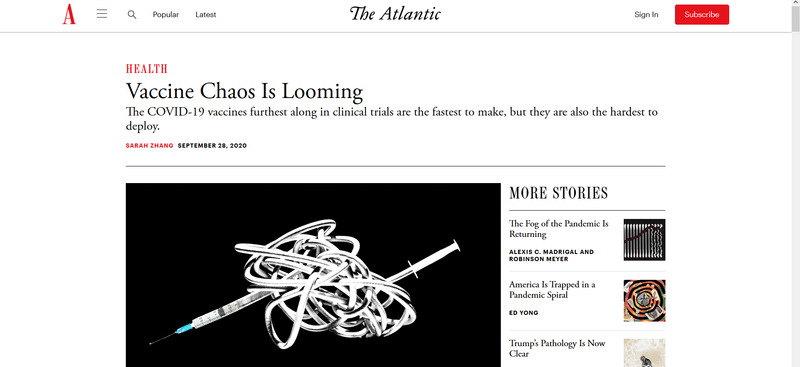Item
"Vaccine Chaos is Looming"
Title (Dublin Core)
"Vaccine Chaos is Looming"
Description (Dublin Core)
As the COVID-19 pandemic approaches its one year anniversary, many are hoping that a vaccine will soon become available at their local pharmacy, clinic, or hospital. Unfortunately, this is very unlikely to be the case, as several problems will inhibit vaccine distribution . In an article for The Atlantic Monthly that was published on September 28, 2020, journalist Sarah Zhang provides readers with a comprehensive overview of the logistical problems associated with manufacturing prospective COVID-19 vaccines and distributing them across the United States.
Zhang begins the article by noting that while some vaccine candidates have progressed very far in clinical trials, the ones that have are also the most difficult to distribute and deploy in the field. This is due to a variety of reasons, the most prominent being the method used to manufacture the vaccine (i.e mRNA encoding), which is a new, experimental method used to manufacture vaccines rapidly. While this technology has sped up vaccine production, it has come at the expense of convenience, as the prospective vaccines by Pfizer and BioNTech require specialized storage containers to maintain the dosage vials at extremely cold temperatures (-94 Fahrenheit). According to Zhang, this need for extreme refrigeration presents a logistical bottleneck for the distribution and deployment of prospective vaccines.
Indeed, according to Zhang, federal, state, and local health departments are making plans for what will most likely be the most ambitious logistical operation in medical history. Logistical problems will be further compounded by issues concerning the lack of preservatives in some vaccines (to speed up production) and the difficulty of delivering dosages to rural areas relative to urban cities. Furthermore, incomplete electronic medical registries in some local areas will make it difficult for health officials to know who exactly needs the vaccine and who should be prioritized when they first become available.
In sum, the rapid production methods used by some prospective COVID-19 vaccines will make them more difficult to distribute and deploy in the field. The need to store some in extremely cold temperatures will raise the costs of transportation and make it extremely difficult to deliver dosages to people living in hard to reach areas of the United States. Furthermore, the incomplete electronic medical registries of some local areas will make it more difficult to know if patients are taking the appropriate number of vaccine doses, which are needed to be completely effective. To paraphrase Zhang, these issues will make the first COVID-19 vaccines to be released to be insignificant, as they will not be widely distributed.
Zhang begins the article by noting that while some vaccine candidates have progressed very far in clinical trials, the ones that have are also the most difficult to distribute and deploy in the field. This is due to a variety of reasons, the most prominent being the method used to manufacture the vaccine (i.e mRNA encoding), which is a new, experimental method used to manufacture vaccines rapidly. While this technology has sped up vaccine production, it has come at the expense of convenience, as the prospective vaccines by Pfizer and BioNTech require specialized storage containers to maintain the dosage vials at extremely cold temperatures (-94 Fahrenheit). According to Zhang, this need for extreme refrigeration presents a logistical bottleneck for the distribution and deployment of prospective vaccines.
Indeed, according to Zhang, federal, state, and local health departments are making plans for what will most likely be the most ambitious logistical operation in medical history. Logistical problems will be further compounded by issues concerning the lack of preservatives in some vaccines (to speed up production) and the difficulty of delivering dosages to rural areas relative to urban cities. Furthermore, incomplete electronic medical registries in some local areas will make it difficult for health officials to know who exactly needs the vaccine and who should be prioritized when they first become available.
In sum, the rapid production methods used by some prospective COVID-19 vaccines will make them more difficult to distribute and deploy in the field. The need to store some in extremely cold temperatures will raise the costs of transportation and make it extremely difficult to deliver dosages to people living in hard to reach areas of the United States. Furthermore, the incomplete electronic medical registries of some local areas will make it more difficult to know if patients are taking the appropriate number of vaccine doses, which are needed to be completely effective. To paraphrase Zhang, these issues will make the first COVID-19 vaccines to be released to be insignificant, as they will not be widely distributed.
Date (Dublin Core)
Creator (Dublin Core)
Contributor (Dublin Core)
Type (Dublin Core)
link
Link (Bibliographic Ontology)
Controlled Vocabulary (Dublin Core)
Contributor's Tags (a true folksonomy) (Friend of a Friend)
Collection (Dublin Core)
English
Vaccine Stories
Date Submitted (Dublin Core)
11/04/2020
Date Modified (Dublin Core)
01/30/2021
Item sets
This item was submitted on November 4, 2020 by Carlos Castro using the form “Share Your Story” on the site “A Journal of the Plague Year”: https://covid-19archive.org/s/archive
Click here to view the collected data.
